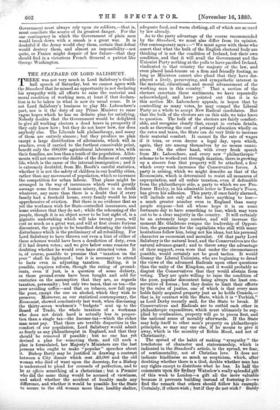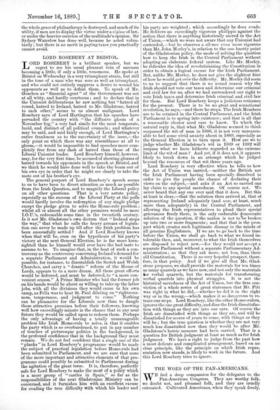THE STANDARD ON LORD SALISBURY. rE RE was not very much
in Lord. Salisbury's Guild- hall speech of Saturday, but we cannot agree with the Standard that he missed. an opportunity in not declaring his sympathy with all efforts to raise the material and moral condition of working men, at least if that declara- tion into be taken in what is now its usual sense. It is not Lord Salisbury's business to play Mr. Labouchere's part, nor is it the duty of any Prime Minister to raise vague hopes which he has no definite plan for satisfying. Nobody doubts that the Government would be delighted to give all working electors a dead. heave in prosperity if they only knew how; but they do not know how, nor does anybody else. The Liberals talk philanthropy, and many of them are entirely sincere ; but they produce no plan except a large distribution of allotments, which will in practice, even if carried to the furthest conceivable point, benefit only the 600,000 agricultural labourers who, with their families, are less than a tenth of the population. Allot- ments will not remove the dislike of the dullness of country life, which is the cause of the internal immigration; and it is extremely doubtful, from Mr. Booth's careful statistics, whether it is not the safety of children in our healthy cities, rather than any movement of population, which so increases the competition for urban labour. That plans might be arranged in the way of insurances which would greatly assuage some forms of human misery, there is no doubt whatever, any more than there is a doubt that if every family had a freehold house, every family would be less apprehensive of eviction. But there is no evidence that as yet the workmen wish for State-controlled insurances, and. some evidence that they do not ; while the rehousing of the people, though it is an object never to be lost sight of, is a gigantic undertaking which will take twenty years, will cost as much as a great war, and will at first create furious discontent, the people to be benefited detesting the violent disturbance which is the preliminary of all rebuilding. For Lord Salisbury to have thrown out even a hint of either of these schemes would have been a dereliction of duty, even if it had drawn votes ; and we give below some reasons for doubting whether he would even h&ye attracted votes. It is, of course, possible to promise that "taxation on the poor" shall be lightened ; but it is necessary to attend to facts even in adjusting taxation. Rating, it is possible, requires reform, though the rating of ground- rents, even if just, is a question of some dubiety, as these ground-rents have been bought and sold. for centuries on the assumption that they are, as regards taxation, personalty ; but only two taxes, that on tea—the poor avoiding coffee—and. that on tobacco, now fall upon the poor, except the one on alcohol, which they wish to preserve. Moreover, as our statistical contemporary, the Economist, showed ,conclusively last week, when discussing the thirty-seven workmen's " budgets " sent up to the Boar& of Trade, the whole taxation of a workman who does not drink hard is actually less in propor- tion than a single tax—the Income-tax—which the richer man must pay. That there are terrible disparities in the comfort of our population, Lord Salisbury would. admit as freely as any philanthropist in England, and. that they should be removed if possible ; but no one has yet devised a plan for • removing them, and till such a plan is formulated, her Majesty's Ministers are the bat persons who ought to make " popular " speeches about it. Bishop Barry may be justified in drawing a contrast between a City dinner which cost £3,000 and the old. woman who died of want upon the doorstep, for a Bishop is understood to plead for counsels of perfection, and. to be ex officio something ot a rhetorician ; but a Premier who did the same thing would be accused of viewiness, and asked whether the accident of locality made any difference, and whether it would be possible for the State to secure to the old. woman more than healthy shelter, adequate food, and warm clothing, all of which are secured by law already. As to the party advantage of the course recommended by the Standard, we must also differ from its opinion. Our contemporary says:—"We must agree with those who assert that what the bulk of the English electoral body are thinking of is not the condition of Ireland, but their own condition, and that it will avail the Government and the Unionist Party nothing at the polls to have pacified Ireland, vindicated in that country the majesty of the law, and even placed land-tenure on a firm and friendly footing, so long as Ministers cannot also plead that they have dis- played a lively, persevering, and sympathetic interest in the material, educational, and moral advancement of the working man in this country." That a section of the electors entertain these sentiments, we have repeatedly acknowledged, and have pointed out that it is to this section Mr. Labouchere appeals, in hopes that by controlling so many votes, he may compel the Liberal Party as a whole to accept New Radical candidates. But that the bulk of the electors are on this side, we take leave to question. The bulk of the electors are fairly comfort- able, and. recognise clearly that, except in certain details, such as throwing the cost of primary education wholly on the rates and. taxes, the State can do very little to increase their material comfort. It cannot fix the rate of wages if it tries, or even decree a legal day, upon which, again, they are among themselves by no means unani- mous. On the other hand, with every fresh speech from Mr. Labouchere, and every new " philanthropic " scheme to be worked out through taxation, there is growing up a sincere fear that property will be attacked, a fear which every week increases the Conservative forces. A party is arising, which we might describe as that of the Economists, which is determined to resist all measures of expropriation, and all unfair taxation, even if defensible from the philanthropic side, a party to which we see Pro- fessor Huxley, in his admirable letter in Tuesday's Times, has given his adhesion. This party, if once fairly alarmed, will include not only all who have anything to lose— a much greater number even in England than many people suppose—but all whose hope it is on some fortunate day to have something to lose, which may turn out to be a clear majority in the country. It will certainly be an extremely large number, and will increase the moment Mr. Gladstone resigns the leadership of Opposi- tion, the guarantee for the capitalists who still with many hesitations follow him, being not his ideas, but his personal character as economist and moralist. Of that party Lord Salisbury is the natural head, and the Conservatives are the natural advance-guard ; and to throw away the advantage of their support, even were that under the circumstances possible, would certainly not be good. tactics. It would dismay the Liberal Unionists, who are beginning to dread the views of the advanced Radicals upon other questions than the unity of the Kingdom, and it would probably so disgust the Conservatives that they would. abstain from voting. They are quite willing to raise the condition of the poor, popular discontent being always the least con- servative of forces ; but they desire to limit their efforts by the rules of justice, one of which is that every man holds fairly acquired property just as he holds Consols,— that is, by contract with the State, which it is "Turkish," as Lord Derby recently said, for the State to break. If Conservatives and. Radicals are to outbid each other in philanthropic expenditure, which must ultimately be sup- plied by confiscation property will go to pieces first, and. the national sense Of morality afterwards. If the State may help itself to other men's property on philanthropic principles, so may any one else, if he means to give it away, which is the morality of Robin Hood, and not of Christianity.
The spread of the habit of making " sympathy " the touchstone of character and statesmanship, which is indicated in the Standard's article, is the spread, we fear, of sentimentality, not of Christian love. It does not indicate kindliness so much as scepticism, which, after doubting whether there is a God, doubts whether man has any rights except to distribute what he has. In half the comments upon Sir Sydney Waterlow's really splendid gift of this week to London—a gift all the more valuable because it prevents building instead of fostering it—we find the remark that others should follow his example. Certainly, if others wish ; butif they do, not wish ? Surely the whole grace of philanthropy is destroyed, and much of its utility, if men are to display the -virtue under a regime of law, or under the heavier coercion of the multitude's opinion. Sir Sydney Waterlow has done well, because he acted volun- tarily; but there is no merit in paying taxes you practically cannot avoid.



















































 Previous page
Previous page